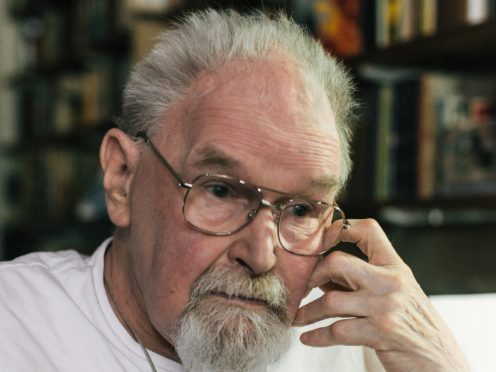Renowned artist and author Alasdair Gray, hailed as a “genius” and “cultural trailblazer”, has died a day after his 85th birthday following a short illness.
The polymath, known for his masterpiece Lanark and novels including Poor Things, died on Sunday at Queen Elizabeth University Hospital in Glasgow with family at his side, publisher Canongate announced.
Gray wrote more than 30 books, all of which he designed and illustrated, and created several murals in his native Glasgow, while his work is also on display in galleries ranging from the V&A to the Scottish National Gallery of Modern Art.
His family said he wanted to donate his body to medical science so there will be no funeral.
In a statement shared by Canongate his family said: “Early this morning we lost a deeply loved member of our family. Alasdair was an extraordinary person; very talented and, even more importantly, very humane.
“He was unique and irreplaceable and we will miss him greatly.
“We would like to thank Alasdair’s many friends for their love and support, especially in recent years, together with the staff of the Queen Elizabeth Hospital, Glasgow, who treated him and us with such care and sensitivity during his short illness.
“In keeping with his principles Alasdair wanted his body donated to medical science, so there will be no funeral.”
First Minister Nicola Sturgeon was among those to pay tribute to him.
She tweeted: “Such sad news. Alasdair Gray was one of Scotland’s literary giants, and a decent, principled human being.
“He’ll be remembered best for the masterpiece that is Lanark, but everything he wrote reflected his brilliance. Today, we mourn the loss of a genius, and think of his family.”
Trainspotting author Irvine Welsh tweeted: “Alasdair Gray was a unique talent. In Lanark, and 1982 Janine especially, he wrote two of the greatest Scottish novels and influenced a creative generation.”
Belle And Sebastian singer Stuart Murdoch wrote on Twitter: “Farewell to Alasdair Gray, Scotland’s great creator.
“We’ll miss you for your art, we’ll miss you for your stories, we’ll miss you for your humanity.”
Gray’s work included novels, short story collections, plays, volumes of poetry, works of non-fiction and translations – most recently, his interpretation of Dante’s Divine Trilogy.
Such sad news. Alasdair Gray was one of Scotland’s literary giants, and a decent, principled human being. He’ll be remembered best for the masterpiece that is Lanark, but everything he wrote reflected his brilliance. Today, we mourn the loss of a genius, and think of his family. https://t.co/rJMWdfoRNL
— Nicola Sturgeon (@NicolaSturgeon) December 29, 2019
His murals can be seen in venues including the ceiling of the Auditorium at the Oran Mor venue and The Ubiquitous Chip restaurant in Glasgow, as well as at the city’s Hillhead underground station.
Francis Bickmore, Gray’s editor and publishing director at Canongate, said: “What sad news this is that Alasdair Gray is gone. It seems hard to believe that Alasdair was mortal and might ever leave us.
“No one single figure has left such a varied legacy – or missed so many deadlines – as Alasdair Gray. At least through Gray’s phenomenal body of work he leaves a legacy that will outlive us all.
“His voice of solidarity and compassion for his fellow citizens, and his forward-looking vision is cause for great celebration and remembrance.”
His agent, Jenny Brown said: “We mourn Alasdair Gray’s passing, but his genius will live on for readers through his remarkable work.
“He was a cultural trailblazer: nobody has done more to spur on, and give confidence to, the next generation of Scottish writers.”
Professor Sir Anton Muscatelli, principal of the University of Glasgow, also paid tribute.
He said: “Alasdair Gray was one of the true greats of Scottish art and literature. He was writer in residence at the University of Glasgow in the late ’70s and was always a strong and close friend of the university.
“It is with great sadness that we mark his passing, but the many works he produced, from his magnificent novel Lanark to the inspiring murals that adorn the city, ensure that his legacy will live on for many years to come.”
